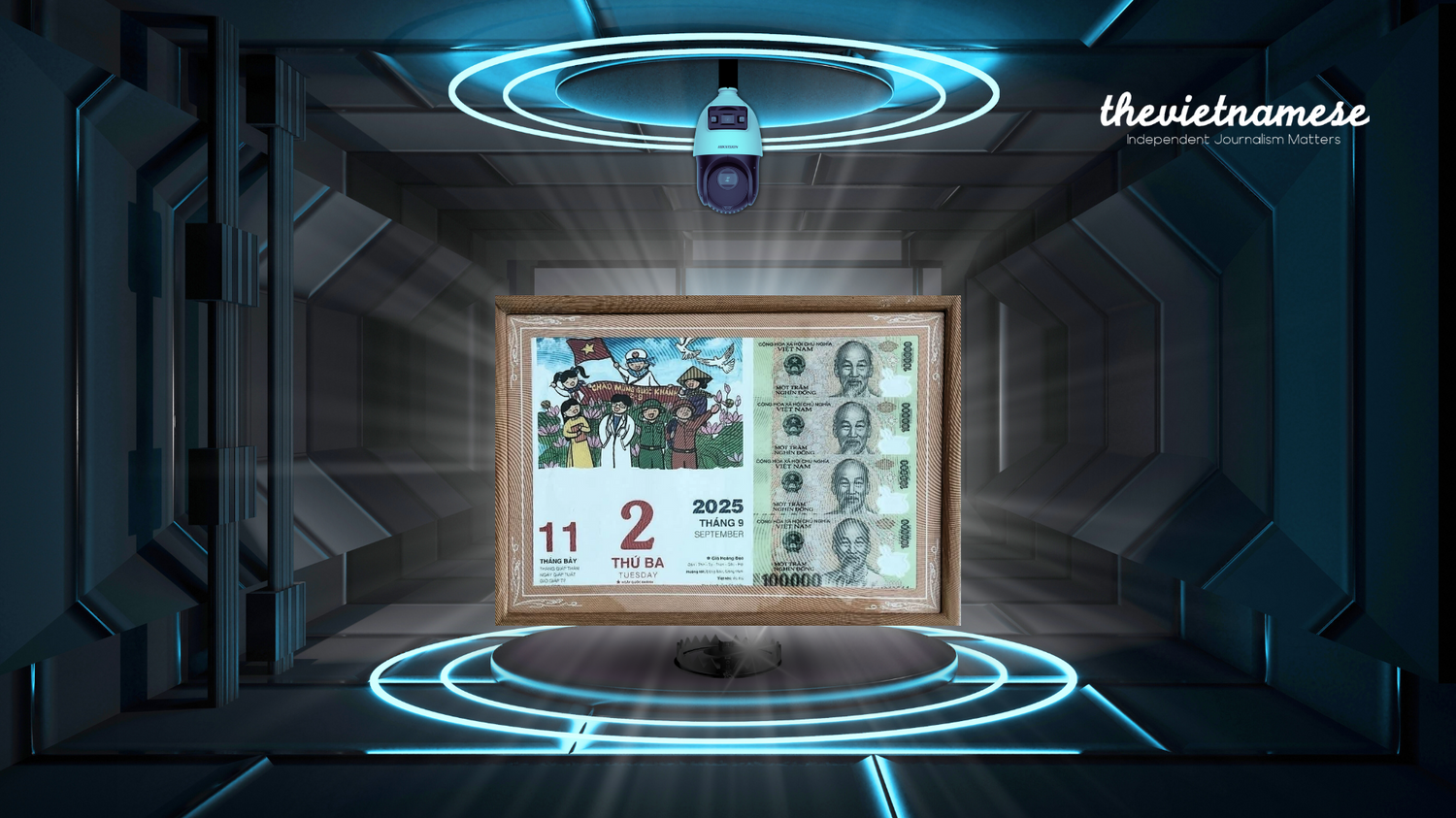Nguyễn Quang A wrote this article in Vietnamese and published it in Luật Khoa Magazine on September 15, 2025. Đàm Vĩnh Hằng translated it into English for The Vietnamese Magazine.
“We are all being watched
We are all about to be arrested”
“Vô cùng” – Hoàng Nhuận Cầm
I felt a chill run down my spine after reading Nguyễn Đức Thành’s article, “An Interesting Policy Initiative,” published in Thời báo Kinh tế Sài Gòn on September 4. [1] The piece discusses giving every citizen 100,000 đồng for National Independence Day. I couldn’t help but think how much more accurate the title would have been if it had been “An Interesting—or Insidious—Policy Initiative?”
A century ago, in 1925, the French sociologist Marcel Mauss (1872–1950) published his masterpiece, “The Gift.” [2] In this profoundly influential essay, Mauss argues that no gift is ever truly voluntary; the acts of giving, receiving, and reciprocating are all compulsory. It is worth recalling the double meaning of the word gift: a present, but also poison. As Mauss himself noted, “According to the conception of the Annamites, receiving gifts is dangerous.”
Nguyễn Đức Thành frames his analysis using the work of French philosopher Michel Foucault, who was inspired by Jeremy Bentham’s (1748–1832) 18th-century panopticon prison model. The panopticon is a circular prison with a central watchtower, designed so that every prisoner feels under constant observation, compelling them to regulate their own behavior. [3]
As Thành writes, “According to Foucault, the history of expanding the power of the modern State is the strengthening of its capacity to make people feel they are constantly being watched, and thereby voluntarily adjust their behavior to the State’s will.”
Thành applies this concept to Việt Nam’s recent push toward digital infrastructure. He notes, “In recent years, Việt Nam has taken steps toward building digital infrastructure, most notably issuing chip-based ID cards and deploying the electronic identification system VNeID for every individual. Along with this comes the trend of integrating personal information (bank accounts, social insurance, property registration, medical monitoring…) into a unified digital platform.”
If such a policy is fully realized, it is nothing less than the construction of a digital panopticon.

Thành argues that the proposed 100,000 VNĐ gift is more than simple welfare distribution; it is a “comprehensive stress test of this digital infrastructure.” He asks, “Can the State accurately distribute [this amount], within a short [period of] time, to 106,855,575 individuals (or 26,843,417 households), while ensuring transparency and safety? If successful, would this not deserve to be recorded in history as an important milestone in Việt Nam’s social development?”
However, Thành assumes this distribution would happen primarily via bank transfers integrated with VNeID, based on what he calls an “original plan.” This assumption appears to contradict the actual government directive, Resolution 263/NQ-CP, issued on Aug. 29, 2025. The resolution specifies the following:
a. A one-time gift per household, the amount determined by the number of registered permanent residents in that household according to the national population database. The head of household (or an authorized member) may collect on behalf of the household, and is responsible for delivering the gifts to other members…
b. Distribution is done through social security accounts on the VNeID application (if already linked); or in cash (if no account exists) at local payout points, ensuring timeliness, safety, and effectiveness.
Essentially, this means that the monetary gifts will be disbursed mainly in cash—through manual distribution—on a per-household basis, with VNeID-linked accounts serving only as a secondary, optional channel.
This raises a critical question: Did the technology-first “original plan” that Thành describes ever truly exist? As of the September 15 distribution deadline, it appears the manual, cash-based method remains primary.
Even if the digital plan were real, it would raise several legal and ethical red flags. Integrating banking and other personal data with the national population database via VNeID must not mean that state bodies, including the Ministry of Public Security, can access this information without due process, such as a court order.
To do so would be a grave violation of Article 13 of the Law on Credit Institutions and the new Law on Personal Data Protection (No. 91/2025/QH15), not to mention the right to privacy guaranteed by the Constitution.
Thành himself acknowledges these risks, writing that “the mechanism for controlling the State itself—that is, limiting the supervisory power of public authorities—still leaves many loopholes.”
He further asks, “Who will supervise the supervisors? Citizens may rightly ask about the system’s security, as well as how their bank data and other information might be used in the future…such a policy would only be sustainable if accompanied by independent, transparent oversight mechanisms, with the power to sanction even State agencies.”
These are valid concerns, but they must be stated more forcefully. The recent cyberattack on the National Credit Information Center (CIC) is a stark warning about the dangers of centralizing sensitive data. [4] We must warn policymakers against any scheme that could bring disaster to the nation by constructing a digital panopticon.
The highest value is freedom, and true development is freedom; economic growth alone is not development. The state’s power must serve national development and the liberty of its citizens. If these cannot be guaranteed—or if there is potential for abuse— then everything must be carefully debated and weighed. Such policies cannot be rushed.
More than 30 years ago, the poet Hoàng Nhuận Cầm wrote: “We are all being watched / We are all already arrested.”
That bleak vision must not, under any circumstance, become Việt Nam’s future. It must not be the destiny of a nation striving to rise.
- Nguyễn Đức Thành, Ph.D. (2025, September 4). Một sáng kiến chính sách thú vị. Tạp Chí Kinh Tế Sài Gòn. https://thesaigontimes.vn/mot-sang-kien-chinh-sach-thu-vi/
- The Gift. (n.d.). nxbtrithuc.com.vn – Tri Thức Publishing House. https://nxbtrithuc.com.vn/Luan-ve-bieu-tang-b11360.html
- The Editors of Encyclopaedia Britannica. (2007, July 16). Panopticon | Surveillance, Discipline, Control. Encyclopedia Britannica. https://www.britannica.com/technology/panopticon
- Quốc Thắng. (2025, September 12). Hacker đánh cắp dữ liệu cá nhân tại CIC. VnExpress. https://vnexpress.net/canh-bao-thu-doan-lua-dao-moi-neu-du-lieu-ca-nhan-tai-cic-bi-lo-4938185.html

